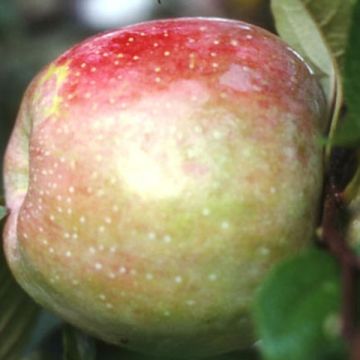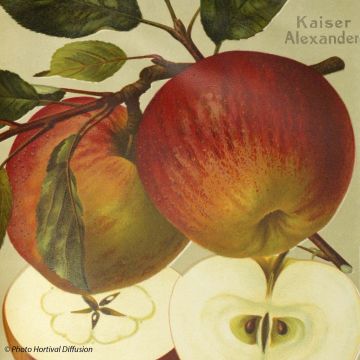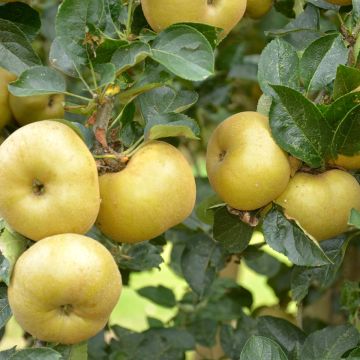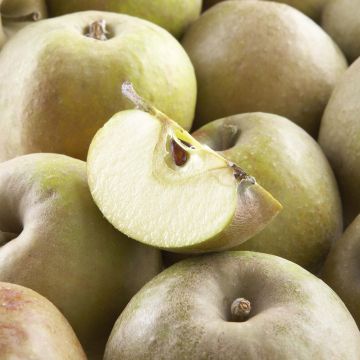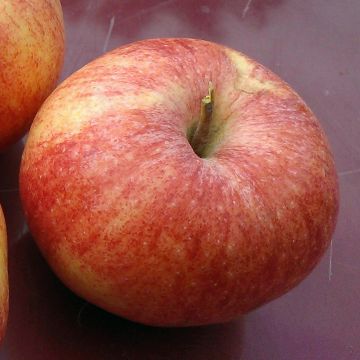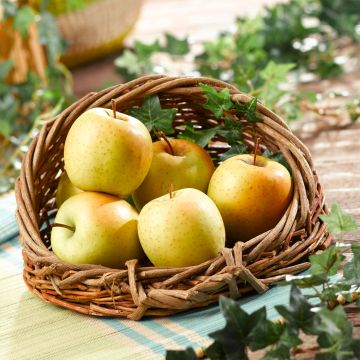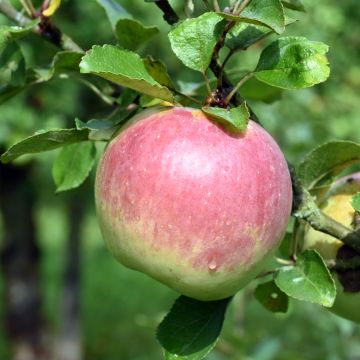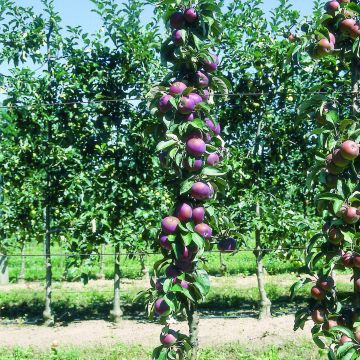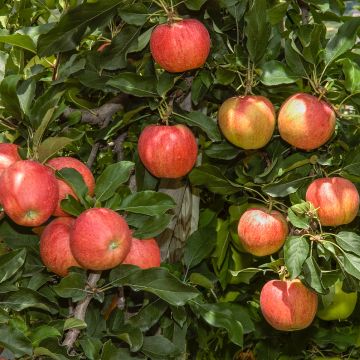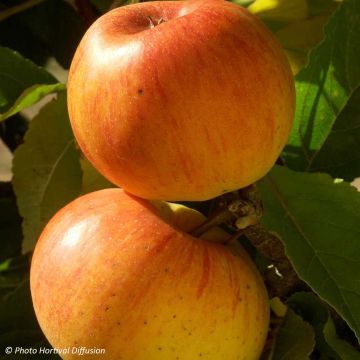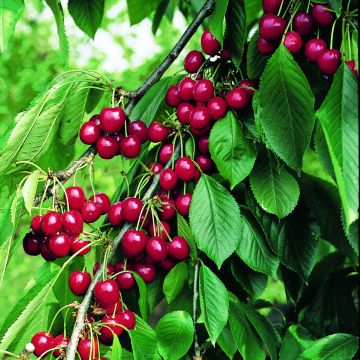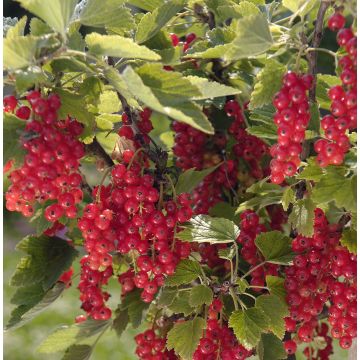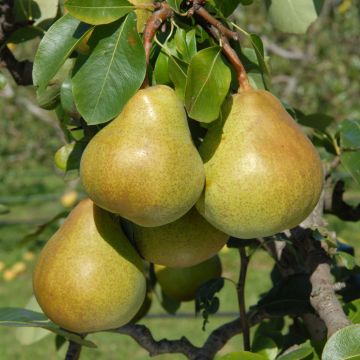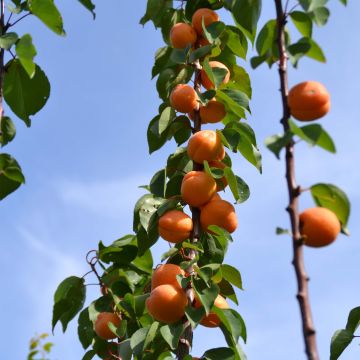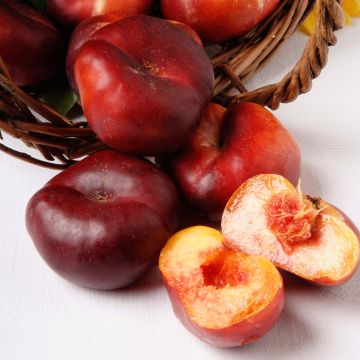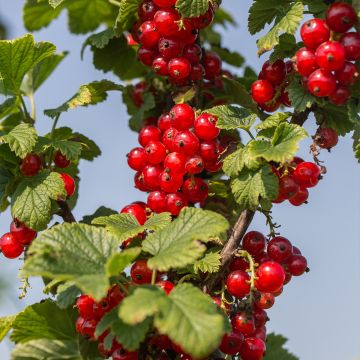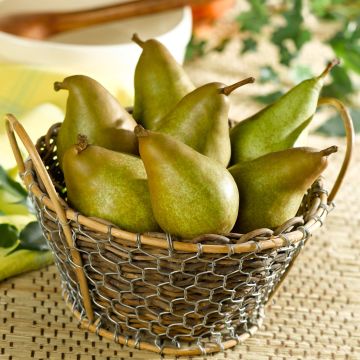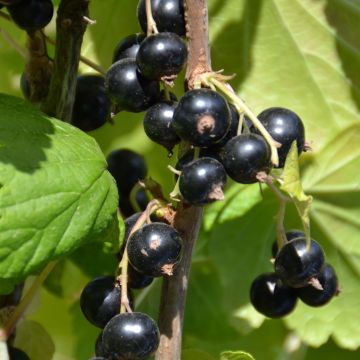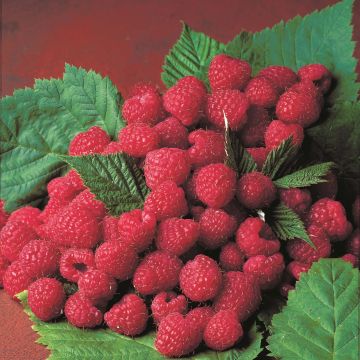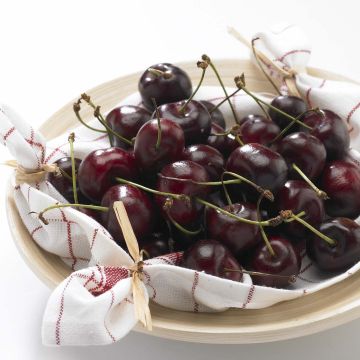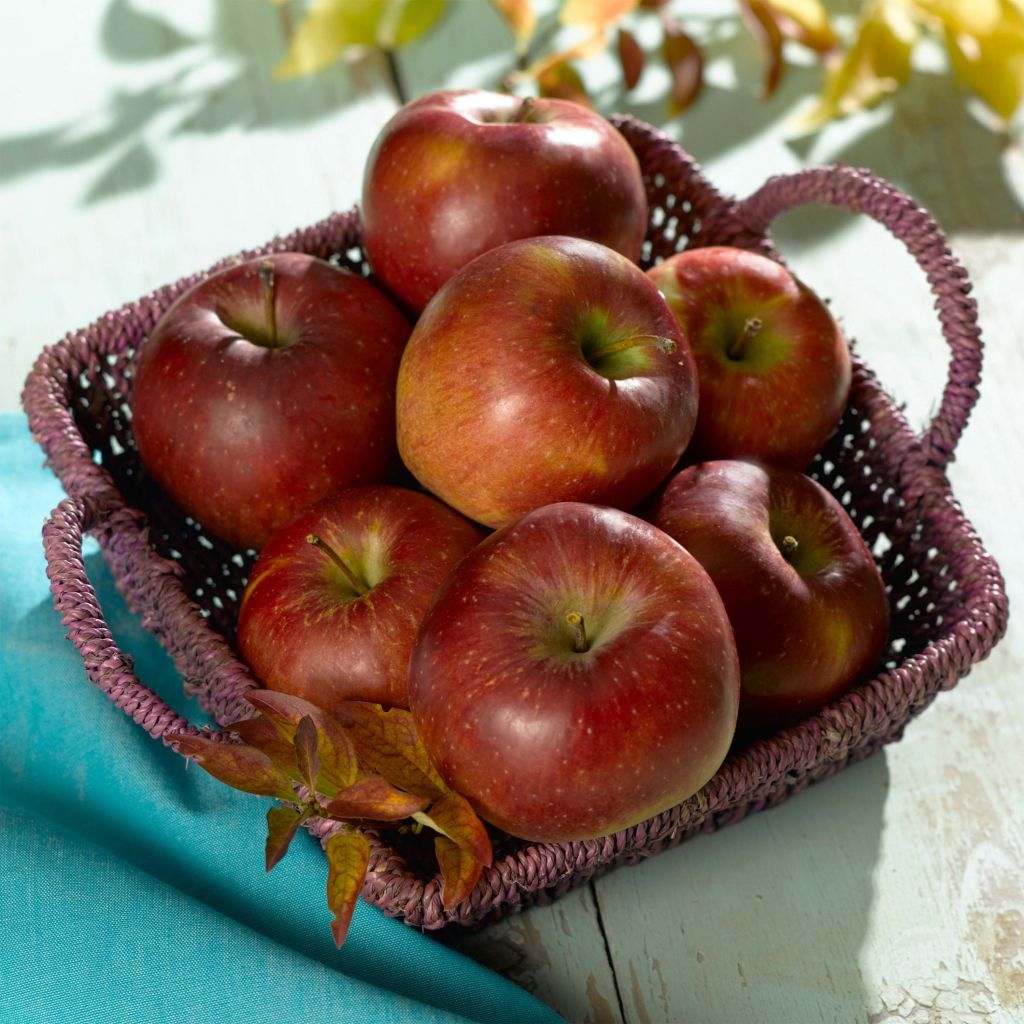

Apple Tree Regali Apple Tree - Georges Delbard
Apple Tree Regali Apple Tree - Georges Delbard
Malus domestica Regali® 'Delkistar'
Apple, Orchard apple, Table apple, Cultivated apple
This item cannot be shipped to the selected country
Delivery charge from €5.90
More information
Schedule delivery date,
and select date in basket
This plant carries a 6 months recovery warranty
More information
We guarantee the quality of our plants for a full growing cycle, and will replace at our expense any plant that fails to recover under normal climatic and planting conditions.
From €5.90 for pickup delivery and €6.90 for home delivery
Express home delivery from €8.90.
Description
Malus domestica Regali ('Delkistar') is a vigorous variety that is highly productive. It consistently produces beautiful crimson-red apples. The round and plump apples are harvested in September-October. Their skin has a lovely red hue, highlighted by a serrated crown. It covers deliciously sweet and fragrant flesh. This versatile apple can be enjoyed both raw and cooked. It is easily used in pastries, pies, and cakes. Regali apples keep well. Stored under good conditions, they can be consumed until January.
Malus domestica belongs to the Rosaceae family. It is cultivated almost everywhere in the world. It includes countless varieties, both old and modern, that produce apples of varying sizes and flavours, ranging from sweet to tart. Apple trees are native to Europe, where their presence has been documented since ancient times.
This variety is disease resistant, particularly to scab. This hardy variety can withstand temperatures as low as -20°C (-4°F), making it ideal for cold climates and mountainous regions. It typically blooms in April. This is not a self-fertile variety. To ensure fruiting, it should be planted near other varieties such as 'Royal Gala', 'Delbard Jubilé', 'Harmonie', or 'Tentation' for pollination.
Apples can be consumed raw or cooked, in compotes, pastries, paired with cheeses, or as an accompaniment to savoury dishes with pork, or in salads. They are rich in carbohydrates and fructose, and are invigorating and rehydrating. They boast a high content of vitamins A, B, C, and E, minerals, antioxidants, and fibre. The fruits can be stored throughout winter. Store in a cool, clean place, protected from light, at a temperature of around 8 to 10°C (46.4 to 50°F), or in a cold room, sealed off from outside air, at a temperature of 1 to 3°C (33.8 to 37.4°F). Apples release ethylene, a gas that promotes fruit ripening. To accelerate the ripening of your other fruits or vegetables, place your apples next to them.
For transportation reasons, our tallest scions may be pruned before shipment. They are suitable for all common training methods: cordons, espaliers, goblets, half-standards, and low standards. They are not suitable for high standards. Please contact us if you would like more information or advice on training your fruit trees.
This fruit tree is delivered in a ready-to-plant root ball. The root ball should be planted as it is. The biodegradable cover that surrounds the root ball and preserves the rootlets will decompose on its own during the plant's growth. By leaving this cover in place, you ensure better establishment.
Report an error about the product description
Apple Tree Regali Apple Tree - Georges Delbard in pictures
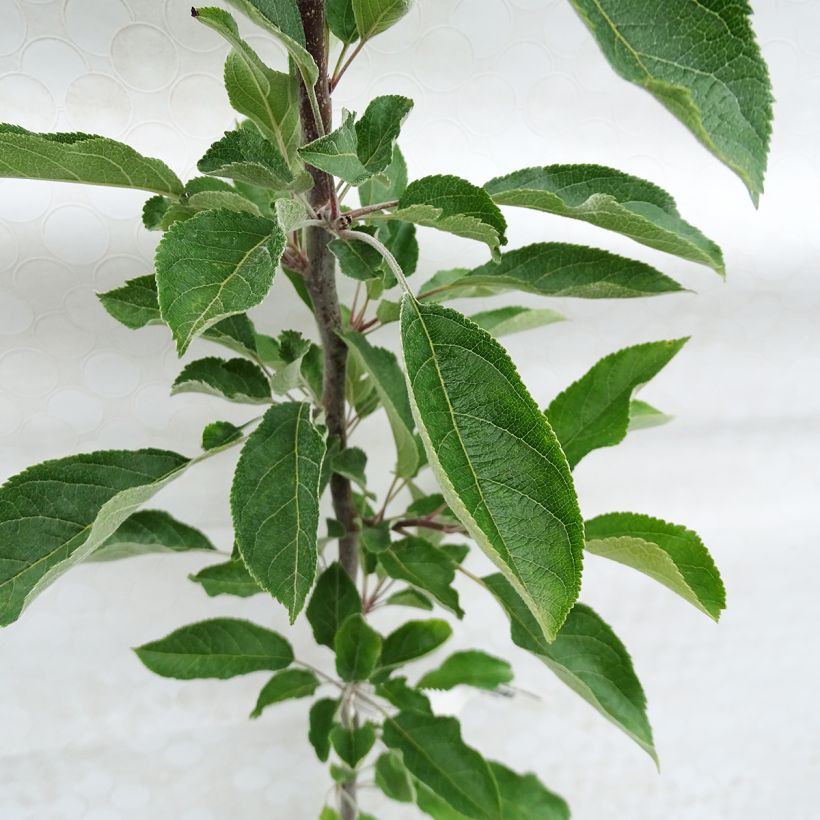

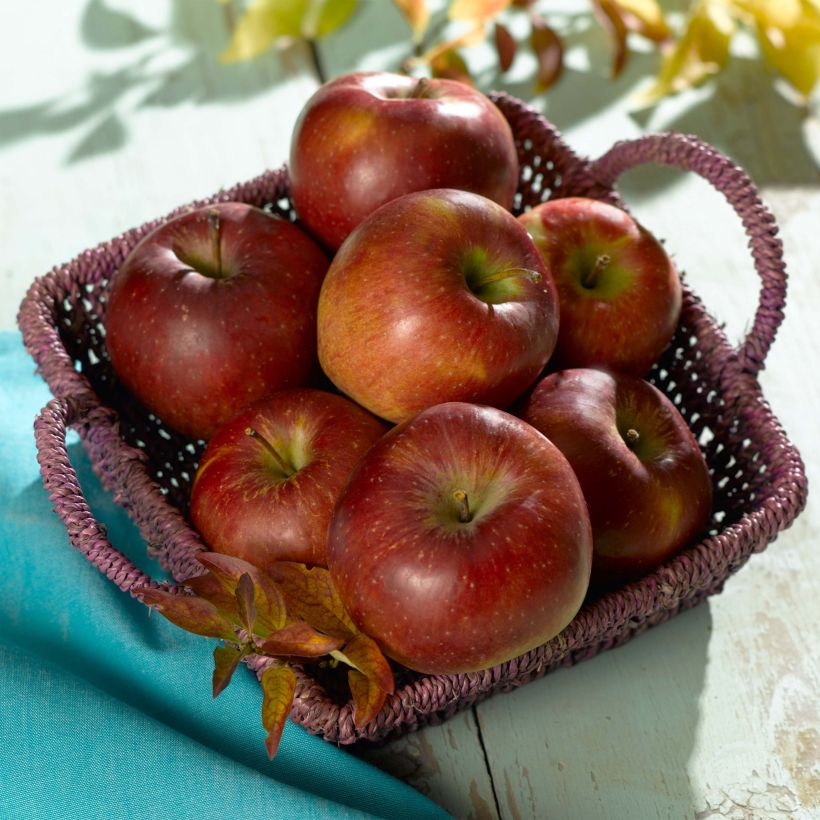

Plant habit
Fruit
Flowering
Foliage
Botanical data
Malus
domestica
Regali® 'Delkistar'
Rosaceae
Apple, Orchard apple, Table apple, Cultivated apple
Cultivar or hybrid
M106 (Ready-to-plant root ball - Goblet)
Other Apple trees
Planting and care
Choose a sunny location. The soil can be slightly chalky or acidic, but not excessively so. Dig a wide planting hole at least 3 times the volume of the root ball. Add organic matter (topsoil, compost) and a base fertiliser, such as crushed horn. Do not bury the graft collar. Stake if necessary. For apple trees planted in isolation and in open areas, it may be useful to stake them by installing a guy wire system: plant 3 stakes in a triangle 50cm (20in) around the trunk and connect them together with pieces of wood. Protect the bark with a piece of rubber, for example, and attach the stakes to the trunk with metal wires. Water abundantly, even in rainy winter. Fruit trees are ideally planted between October and March, outside of the freezing period. Container-grown plants can be planted all year round, except during periods of high heat or frost.
During winter, you can add a small handful of wood ash, which is rich in potash. This will improve fruiting.
Apple trees can be subject to various diseases and pests. In order to limit risks, space the trees sufficiently. You can also plant multi-species hedges and install nesting boxes or insect hotels to attract beneficial insects. In summary: prioritize diversity.
The main diseases of apple trees are scab (brown spots on leaves), brown rot (wilting of flowers and rotting of fruits on the tree), and powdery mildew (white powdery coating on leaves). For these three cases, preventive action is preferred by spraying a decoction of horsetail.
As for pests, the codling moth (or fruit worm) is a small caterpillar, resulting from the laying of a butterfly, which causes holes inside the fruit. Encourage birds and bats into your garden to feast on this pest! In case of aphid infestation, spray a solution based on black soap.
During the harvest, only keep the picked fruits. Store the apples on shelves or in crates with their stem facing downwards. Choose a preferably completely dark, dry and cool place that is frost-free.
Planting period
Intended location
Care
This item has not been reviewed yet - be the first to leave a review about it.
Georges Delbard fruit trees
Haven't found what you were looking for?
Hardiness is the lowest winter temperature a plant can endure without suffering serious damage or even dying. However, hardiness is affected by location (a sheltered area, such as a patio), protection (winter cover) and soil type (hardiness is improved by well-drained soil).

Photo Sharing Terms & Conditions
In order to encourage gardeners to interact and share their experiences, Promesse de fleurs offers various media enabling content to be uploaded onto its Site - in particular via the ‘Photo sharing’ module.
The User agrees to refrain from:
- Posting any content that is illegal, prejudicial, insulting, racist, inciteful to hatred, revisionist, contrary to public decency, that infringes on privacy or on the privacy rights of third parties, in particular the publicity rights of persons and goods, intellectual property rights, or the right to privacy.
- Submitting content on behalf of a third party;
- Impersonate the identity of a third party and/or publish any personal information about a third party;
In general, the User undertakes to refrain from any unethical behaviour.
All Content (in particular text, comments, files, images, photos, videos, creative works, etc.), which may be subject to property or intellectual property rights, image or other private rights, shall remain the property of the User, subject to the limited rights granted by the terms of the licence granted by Promesse de fleurs as stated below. Users are at liberty to publish or not to publish such Content on the Site, notably via the ‘Photo Sharing’ facility, and accept that this Content shall be made public and freely accessible, notably on the Internet.
Users further acknowledge, undertake to have ,and guarantee that they hold all necessary rights and permissions to publish such material on the Site, in particular with regard to the legislation in force pertaining to any privacy, property, intellectual property, image, or contractual rights, or rights of any other nature. By publishing such Content on the Site, Users acknowledge accepting full liability as publishers of the Content within the meaning of the law, and grant Promesse de fleurs, free of charge, an inclusive, worldwide licence for the said Content for the entire duration of its publication, including all reproduction, representation, up/downloading, displaying, performing, transmission, and storage rights.
Users also grant permission for their name to be linked to the Content and accept that this link may not always be made available.
By engaging in posting material, Users consent to their Content becoming automatically accessible on the Internet, in particular on other sites and/or blogs and/or web pages of the Promesse de fleurs site, including in particular social pages and the Promesse de fleurs catalogue.
Users may secure the removal of entrusted content free of charge by issuing a simple request via our contact form.
The flowering period indicated on our website applies to countries and regions located in USDA zone 8 (France, the United Kingdom, Ireland, the Netherlands, etc.)
It will vary according to where you live:
- In zones 9 to 10 (Italy, Spain, Greece, etc.), flowering will occur about 2 to 4 weeks earlier.
- In zones 6 to 7 (Germany, Poland, Slovenia, and lower mountainous regions), flowering will be delayed by 2 to 3 weeks.
- In zone 5 (Central Europe, Scandinavia), blooming will be delayed by 3 to 5 weeks.
In temperate climates, pruning of spring-flowering shrubs (forsythia, spireas, etc.) should be done just after flowering.
Pruning of summer-flowering shrubs (Indian Lilac, Perovskia, etc.) can be done in winter or spring.
In cold regions as well as with frost-sensitive plants, avoid pruning too early when severe frosts may still occur.
The planting period indicated on our website applies to countries and regions located in USDA zone 8 (France, United Kingdom, Ireland, Netherlands).
It will vary according to where you live:
- In Mediterranean zones (Marseille, Madrid, Milan, etc.), autumn and winter are the best planting periods.
- In continental zones (Strasbourg, Munich, Vienna, etc.), delay planting by 2 to 3 weeks in spring and bring it forward by 2 to 4 weeks in autumn.
- In mountainous regions (the Alps, Pyrenees, Carpathians, etc.), it is best to plant in late spring (May-June) or late summer (August-September).
The harvesting period indicated on our website applies to countries and regions in USDA zone 8 (France, England, Ireland, the Netherlands).
In colder areas (Scandinavia, Poland, Austria...) fruit and vegetable harvests are likely to be delayed by 3-4 weeks.
In warmer areas (Italy, Spain, Greece, etc.), harvesting will probably take place earlier, depending on weather conditions.
The sowing periods indicated on our website apply to countries and regions within USDA Zone 8 (France, UK, Ireland, Netherlands).
In colder areas (Scandinavia, Poland, Austria...), delay any outdoor sowing by 3-4 weeks, or sow under glass.
In warmer climes (Italy, Spain, Greece, etc.), bring outdoor sowing forward by a few weeks.

































